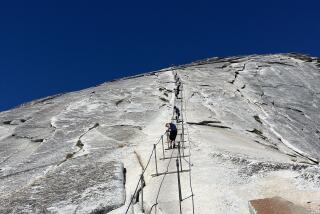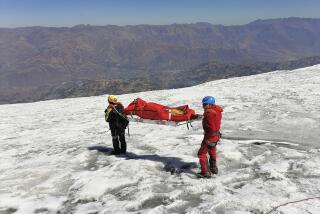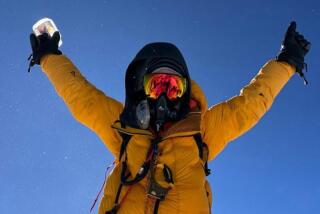BORN TO BE WILD : Reinhold Messner--Cream of Climbers--Rises to Top
SNOWBIRD, Utah — Reinhold Messner has been to the mountaintops--the 14 highest in the world--and what he has seen appalls him.
Cable cars crisscross the great mountains of Europe, trash lines the routes into the Himalayas and Mt. Everest is overcrowded with expeditions. “Most of the expeditions the last five years have been less for adventure and more for show,” Messner says.
That is the inspiration for Messner’s “White Wilderness” concept to defend the world’s remaining unexplored regions against abusive intrusion-- white in that they appear as blank areas on maps, places where only Messner and others like him care to go.
He expounded on his idea this month at the Mountain Summit, a gathering organized by Dan McConnell of Seattle of some of the world’s best climbers, among whom Messner is a giant. He has made more than 3,000 climbs, including about 100 firsts and all 14 of the world’s peaks that reach higher than 8,000 meters (26,000 feet), most without using oxygen, and several alone.
Climbs, he says, not conquests. Messner has paid a dear price. He has lost a brother and several friends, six toes and a fingertip, the latter because of frostbite.
“I never conquer a mountain,” he said. “You cannot conquer a mountain. This (thinking) is typical of the ‘50s.”
In 1953, Sir Edmund Hillary of New Zealand, and Sherpa guide Tenzing Norgay became the first to ascend Everest, the highest of all at 29,100 feet, according to a recent re-survey. The feat launched a new era in mountaineering and elevated the high-altitude climber into a romanticized role that few non-climbers can really understand.
“I see the mountain as a big piece of nature which excludes human beings, and should remain like this,” Messner said. “You can’t go and see it, and it’s difficult to watch on television, especially live.”
Those who have experienced it know that the mountain is not something beautiful, Messner said.
“It’s something strong and destroying people,” he said. “It’s something for staying a few weeks, a few months, but not forever.”
So Messner will leave the mountains alone for a while and alter his goals from vertical to horizontal. In October, he and Arvet Fuchs will attempt to walk across Antarctica without support or the use of sled dogs.
“I had a chance to have live television on the Antarctica expedition and I refused,” Messner said. “It would not be the same thing. I would have to prepare such a big expedition that my experience, my adventure, would not be the same.”
His purpose: “I go to show it is still a clean place for adventure--not to store atomic wastes or to explore for (oil).”
Messner, 44, grew up in the Sud Tirol region of northeastern Italy, a cross-culture pocket of German-speaking people whose Alpine territory has been disputed since medieval times.
It was Austrian territory until after World War I, when it became part of Italy. But at the outbreak of World War II, according to Messner, 90% of the people identified more with Hitler’s Third Reich than with Mussolini--a fact, he says, that “nobody likes to speak about.”
Messner, born at the end of World War II, wrote one of his 29 books on the subject.
His home, he says, is “one of the most beautiful climbing areas of the world, like Yosemite Valley. Maybe more beautiful. Now they made roads and (it’s) all full of skiing areas.
“When I was 5 years old, I did my first climb with my father . . . climbed a 10,000-foot peak. And from there, a little more difficult every year.”
Messner started as a rock climber, with no interest in lofty summits, but it was probably inevitable that as he exhausted the available challenges he would find his way to the Himalayas--there, to mold his ethic to climb without oxygen and to climb alone.
“On my first expedition at 8,000 meters I left my brother, and my second expedition at 8,000 meters I left two friends,” he said. “After that, I said, ‘In the future, I will do it alone so I am not responsible for them.’
“But the other reason is the experience: to be alone with your own fears. If you are on your own in a difficult situation, it’s difficult to handle it by yourself . . . nobody to lean on. It’s much more difficult to climb without a partner than without oxygen.”
Reinhold Messner, the most celebrated mountaineer of modern times, afraid?
“Many times,” he said. “On all big climbs, there is a moment before you start from base camp . . . knowing all the climbing history and all the things that can happen on a big mountain. Each of us is human. We make mistakes.
“If you are on top of the climbing scene, it is very difficult to stay alive on the small line between doing something foolish and doing something great. If you do one mistake in a difficult situation, you did it. Forever.”
But more than fear, Messner has respect for the mountains he climbs. He speaks of approaching a mountain by “fair means.”
“I like to have for me, personally, the experience of what human beings are feeling at 8,000 meters,” he said. “If I use oxygen, it’s like going to 5- or 6,000 meters. If I climbed Everest with oxygen I would cheat myself.”
Then there is Messner the environmentalist, who has seen hundreds of empty oxygen bottles strewn along the routes like aluminum cans.
“If you don’t carry oxygen up, you cannot leave a bottle up there,” he said.
Once he reached two 8,000-meter summits on a single climb, descending only to the saddle connecting them. It took eight days. He was alone. He used no oxygen. It was dangerous.
So, it was suggested, is auto racing.
“But in (auto racing) it is the velocity and the machine that decides (the fate of the driver),” he said. “In a big climb, it is nature which decides. There can be an avalanche, a storm.
“But without the risk of death, climbing would not be the same. The motivation would not be the same. With the risk of dying, it’s a totally different approach. We all know that death is one of the big taboos, especially for Western people--not for Asian people. The most important fact in our life is we have to die. But normally we don’t know this up to the end.
“Going near death, you have a chance to know these things. Knowing about death means having the interest to know more and more--not to die.”
Few--perhaps no one--will ever reach the heights that Messner has achieved.
“It will be more difficult for the next generation,” he said. “But they have to surpass. Otherwise, they stay the same, and human beings can never stay the same.
“They can do more difficult routes (or) traverses (up one side, down the other). They’ll go up Everest someday on the South Face. It’s still undone.”
Will he try it?
“I’m the first to congratulate whoever does it,” Messner said, smiling.
He would prefer, he said, a better legacy.
“The next generations will not remember us for how many 8,000-meter peaks we climbed or how many records we set, but how we left those wild places.”
More to Read
Sign up for The Wild
We’ll help you find the best places to hike, bike and run, as well as the perfect silent spots for meditation and yoga.
You may occasionally receive promotional content from the Los Angeles Times.






